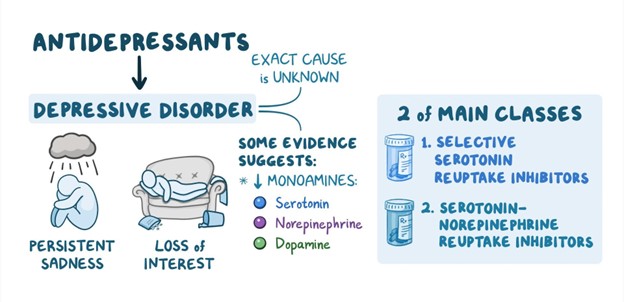A nurse is reviewing medication records for several clients who have bipolar disorder. The nurse should recognize that which of the following medications are used to treat clients who have bipolar disorder? (Select all that apply.)
Lithium
Carbamazepine
Valproate (Valproic acid or Divalproex sodium)
Paroxetine
Donepezil
Correct Answer : A,B,C,D
A. Lithium: Lithium is a mood stabilizer commonly used in the treatment of bipolar disorder. It helps to control mood swings and prevent the recurrence of manic and depressive episodes.
B. Carbamazepine: Carbamazepine is an anticonvulsant medication that has been found effective in managing mood swings in bipolar disorder. It can help stabilize mood and prevent manic episodes.
C. Valproate (Valproic acid or Divalproex sodium): Valproate is another anticonvulsant medication that is used as a mood stabilizer in bipolar disorder. It can help control manic and mixed episodes.
The following options are not used to treat bipolar disorder:
D. Paroxetine: SSRIs, including paroxetine, carry a risk of inducing mania or hypomania in individuals with bipolar disorder. This risk is why these medications are usually avoided or used cautiously, always in conjunction with a mood stabilizer like lithium, valproate, or atypical antipsychotics. Before initiating paroxetine, it’s crucial that the client is stabilized with a mood stabilizer to minimize the risk of mood switching (i.e., moving from depression to mania or hypomania).
E. Donepezil: Donepezil is a medication used to treat Alzheimer's disease and other forms of dementia. It is not used to treat bipolar disorder.
Nursing Test Bank
Naxlex Comprehensive Predictor Exams
Related Questions
Correct Answer is D
Explanation
A. "It doesn't really matter what time you take your medications as long as you don't skip any doses."
While it's important not to skip doses, taking medications at specific intervals is often necessary for maintaining therapeutic blood levels and optimal treatment outcomes. Disregarding specific timing can affect the effectiveness of the medications.
B. "We'll have to talk to your provider about switching to an alternative schedule."
This response may not consider the client's preferences and might not be necessary if the client's current schedule can be adjusted to suit their routine. Collaboration between the nurse and the client is essential.
C. "You really shouldn't change the schedule we established here in the facility."
While continuity in medication schedules is important, if the established schedule doesn't align with the client's daily life, there should be flexibility to adjust it in a way that still maintains the effectiveness of the medications.
D. "Let's work together to devise a time schedule that is convenient for you on a daily basis."
Explanation: It's important to consider the client's lifestyle and routines when developing a medication schedule to ensure optimal adherence. Collaboratively working with the client to create a schedule that fits their daily activities increases the likelihood that they will consistently take their medications as prescribed.
Correct Answer is B
Explanation
This action might be premature. MAOIs (Monoamine Oxidase Inhibitors) are a class of antidepressants with specific dietary and medication interactions. They are typically considered when other classes of antidepressants have not been effective. It's important to exhaust other options before considering a switch to MAOIs.
B. Explain that antidepressants often take several weeks to be fully effective:
Explanation: Correct Answer. This is an appropriate response. Antidepressants, including citalopram, can take several weeks to show their full therapeutic effects. It's common for some symptoms to improve before others. Educating the client about the delayed onset of action is important to manage their expectations.
C. Tell the client that the provider will need to change citalopram to a different medication:
Explanation: It might be too early to consider changing the medication after just two weeks, especially since the client reports an improved appetite. Changes in dosage or medication should ideally be discussed with the provider after an adequate trial period.
D. Recommend a sleep study be done on the client:
Explanation: While sleep problems can be associated with depression, it might not be the most appropriate next step based solely on the information provided. It's more important to address the ongoing depressive symptoms before focusing solely on sleep.

Whether you are a student looking to ace your exams or a practicing nurse seeking to enhance your expertise , our nursing education contents will empower you with the confidence and competence to make a difference in the lives of patients and become a respected leader in the healthcare field.
Visit Naxlex, invest in your future and unlock endless possibilities with our unparalleled nursing education contents today
Report Wrong Answer on the Current Question
Do you disagree with the answer? If yes, what is your expected answer? Explain.
Kindly be descriptive with the issue you are facing.
